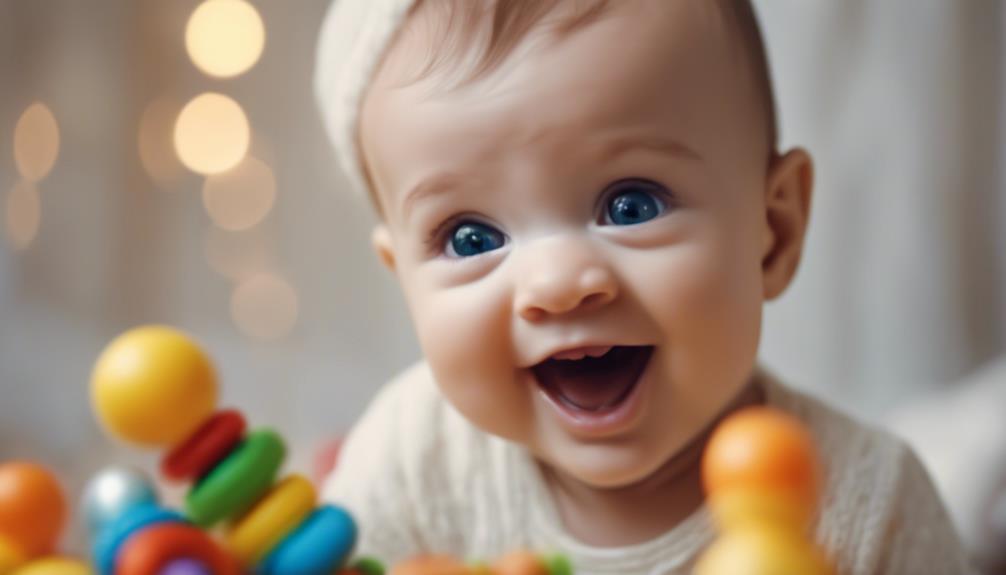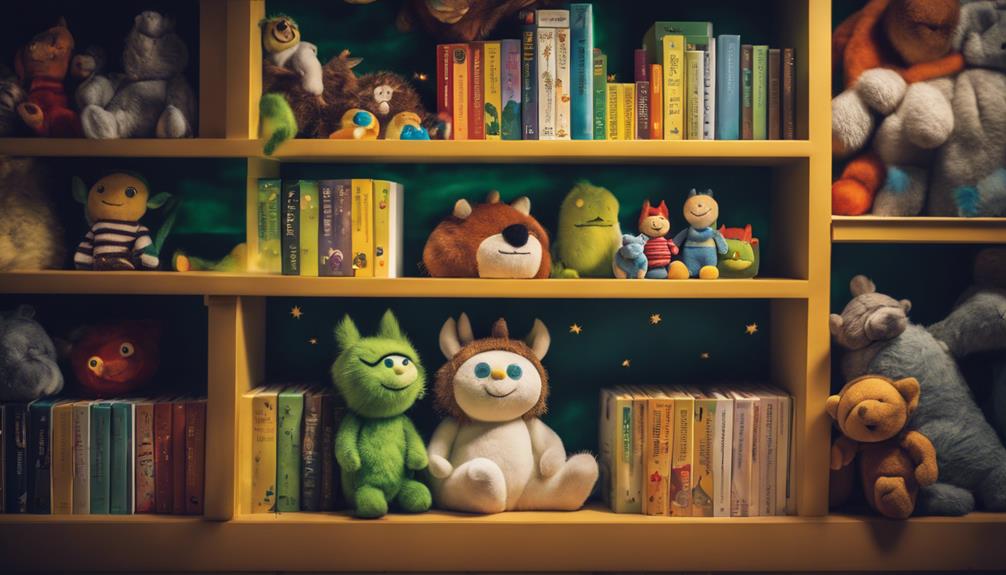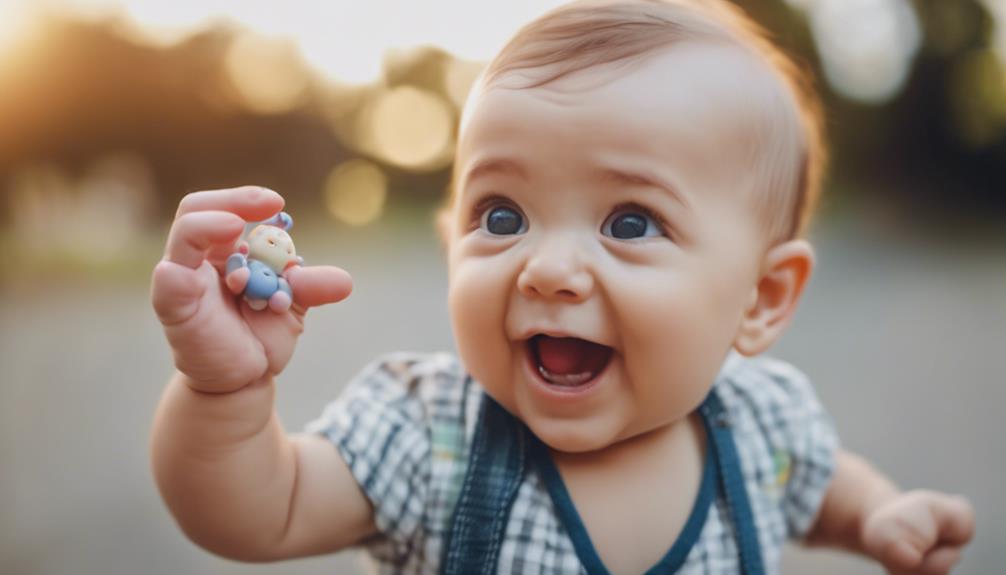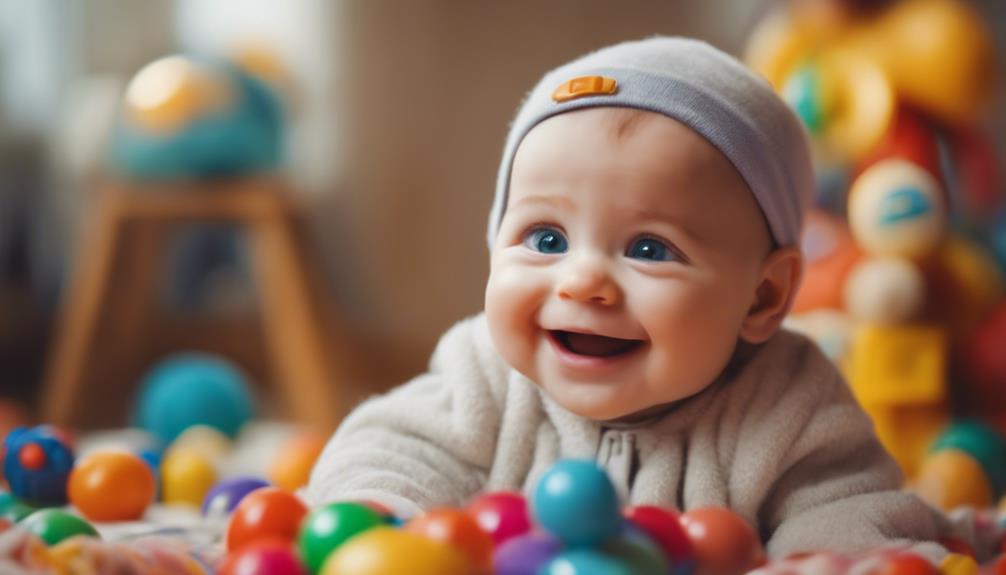To ensure your baby’s well-being, pay attention to visual engagement such as bright eyes following movements and smiles for positive interactions. Developing healthy feeding habits includes a proper latch and regular feedings every few hours. Responsive communication, including eye contact and positive responses, helps cultivate emotional bonds. Emotional regulation is demonstrated when babies remain calm in times of distress. Cognitive milestones include recognizing faces and tracking objects. Caregiver bonding ultimately influences social skills and emotional regulation, which are crucial for building healthy relationships. By observing these cues, you can effectively support your baby’s health and development.
Key Takeaways
- Visual engagement: Bright eyes, tracking movements, and smiling show healthy social and cognitive development.
- Healthy feeding habits: Regular feedings, good latch, and weight gain ensure adequate nutrition.
- Responsive communication: Eye contact, smiling, and positive responses foster emotional intelligence.
- Emotional regulation: Calmness in distress, self-soothing, and seeking comfort indicate well-being.
- Cognitive development: Recognizing faces, tracking objects, and brain growth milestones are crucial for growth.
Visual Engagement
To gauge your baby's visual engagement, observe their bright, attentive eyes tracking movements and focusing on objects. Eye contact and smiling play significant roles in indicating healthy social interactions and cognitive development in infants. When your baby locks eyes with you or flashes a smile, it shows their emotional bonding and cognitive progress.
Responding to visual cues such as toys or familiar faces showcases their developing visual engagement skills. According to child development experts, 'Babies use visual engagement as a key tool for learning about the world around them and forming connections with caregivers.' Recognizing familiar faces and objects further demonstrates your baby's cognitive abilities and emotional attachment.
As your baby grows, their visual engagement will continue to evolve, aiding in their overall cognitive and emotional development. By nurturing and encouraging their visual engagement through interaction and exposure to various stimuli, you can support their healthy growth and well-being.
Healthy Feeding Habits
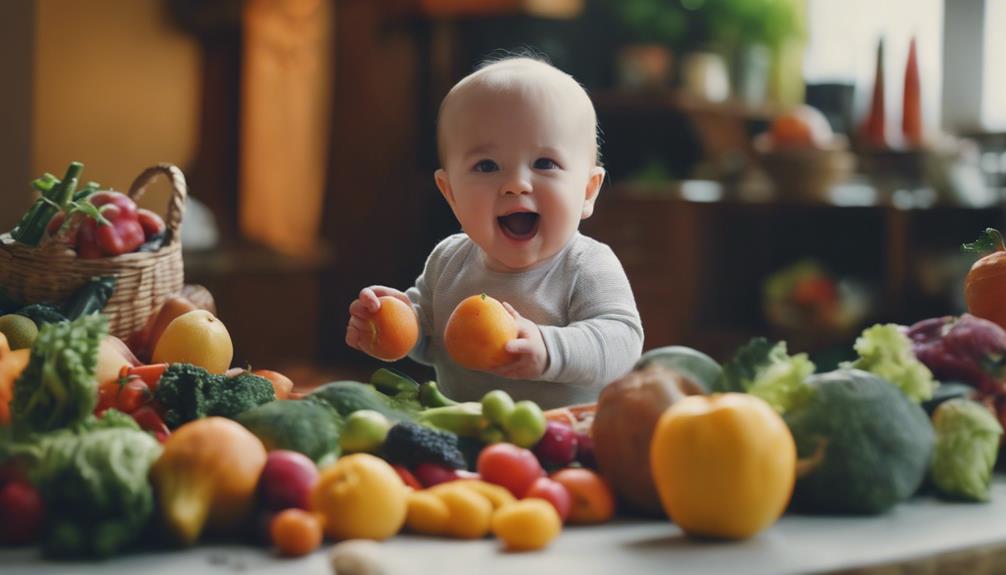
Make sure your baby has a good latch or effective bottle-feeding technique to guarantee they receive adequate milk intake. When feeding well, your baby will show signs of a good appetite, having regular feedings every few hours.
Monitoring feeding frequency is crucial to make certain your baby is getting the nutrition they need for healthy weight gain. If you notice your baby isn't feeding regularly or showing signs of a healthy appetite, it may be necessary to seek guidance from healthcare providers.
Responsive Communication

Engaging with your baby through eye contact, smiling, and soothing voices is key to fostering responsive communication. By making eye contact and responding to your baby's cues, you create a positive environment for healthy development.
Babies thrive when they receive attention and interaction from their caregivers. Responding promptly to their gestures and sounds helps in building a strong emotional bond. Research shows that positive responses to stimuli play an essential role in babies' social and emotional well-being.
According to child development experts, 'Responsive communication is vital for nurturing a child's emotional intelligence.' By actively engaging with your baby, you provide them with the necessary support for their overall growth.
Emotional Regulation

When it comes to emotional regulation in babies, observing signs of calmness in distress and responsiveness to caregivers are key indicators of a healthy development.
Babies who can regulate their emotions effectively tend to show adaptability and self-soothing behaviors, leading to reduced stress and better overall well-being.
Calmness in Distress
Healthy babies demonstrate emotional regulation by exhibiting calmness during distress, showcasing their self-soothing abilities. This ability to remain composed in challenging situations is a vital aspect of their well-being and mental health.
When faced with distress, babies who can self-regulate their emotions by seeking comfort from caregivers or engaging in self-soothing behaviors display adaptability and the capacity to manage their emotions effectively.
- Seeking comfort from caregivers
- Engaging in self-soothing behaviors
- Demonstrating adaptability
- Managing emotions effectively
- Showcasing the ability to calm down after experiencing stress or discomfort
These signs of emotional regulation in babies indicate a strong foundation for their future mental health and well-being. By honing their self-soothing abilities and learning to manage distress, babies develop essential skills that will help them navigate the ups and downs of life with resilience and grace.
Responsive to Caregivers
To understand emotional regulation in babies, observe how they respond to their caregivers as a key indicator of their secure attachment and well-being. Responsive infants engage in eye contact, smile, and exhibit positive mood during interactions, showcasing their ability to connect emotionally.
Emotional regulation is evident when babies respond to soothing voices, showing their capacity to calm down and seek comfort. Healthy infants display emotional responses to familiar voices, emphasizing the importance of building a strong bond with caregivers for positive social interactions.
Encouraging babies to engage with caregivers fosters secure attachment, contributing to their emotional development. By responding positively to caregivers, babies demonstrate their ability to regulate emotions and form secure attachments for healthy social interactions.
It's essential to recognize these cues and nurture responsive behavior towards caregivers to promote emotional well-being in infants.
Cognitive Development
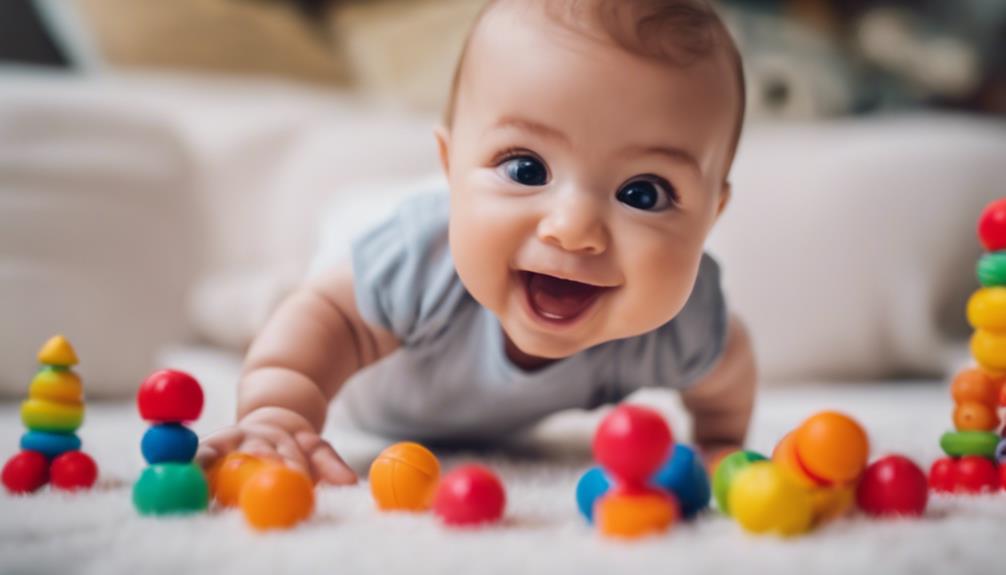
When it comes to cognitive development in babies, milestones in brain growth play a vital role.
As your baby learns to recognize familiar faces and objects, their memory skills are developing.
Understanding these key points can help you track your baby's cognitive progress and make sure they're hitting important learning milestones.
Brain Growth Milestones
As your baby grows, they'll naturally start discerning sounds and reacting to new noises as key milestones in their cognitive development. It's essential to comprehend the importance of these brain growth milestones for your baby's overall well-being.
Here are some key points to ponder:
- Curiosity about new sounds and responsiveness to soothing voices are signs of cognitive progress.
- Responding to sounds by looking for their source indicates cognitive development in babies.
- Babies observe patterns, colors, and movements to enhance their cognitive skills.
- Tracking objects and following movements show cognitive advancement in infants.
- Creating a stimulating environment helps in the healthy development of your newborn's social and language skills.
Learning and Memory
Understanding how babies develop cognitive skills like learning and memory is essential for their overall growth and development. Cognitive development in infants involves processes such as attention, perception, memory, and problem-solving. Interactions with the environment play an important role in shaping these cognitive abilities. By exposing babies to various stimuli and experiences, their memory and learning capabilities are enhanced.
Repetition is key in helping babies form memory connections, aiding in the recognition of familiar faces, objects, and routines. Research suggests that cognitive development in babies sets the stage for future learning and problem-solving skills. According to Dr. Smith, a renowned child psychologist, 'Early interactions and experiences greatly impact a child's cognitive development, laying the groundwork for advanced learning abilities.'
As such, it's essential for caregivers to provide a stimulating environment that encourages exploration and learning. By fostering a rich environment with diverse stimuli, caregivers can support the cognitive growth of babies and help them develop essential memory and learning skills.
Physical Milestones
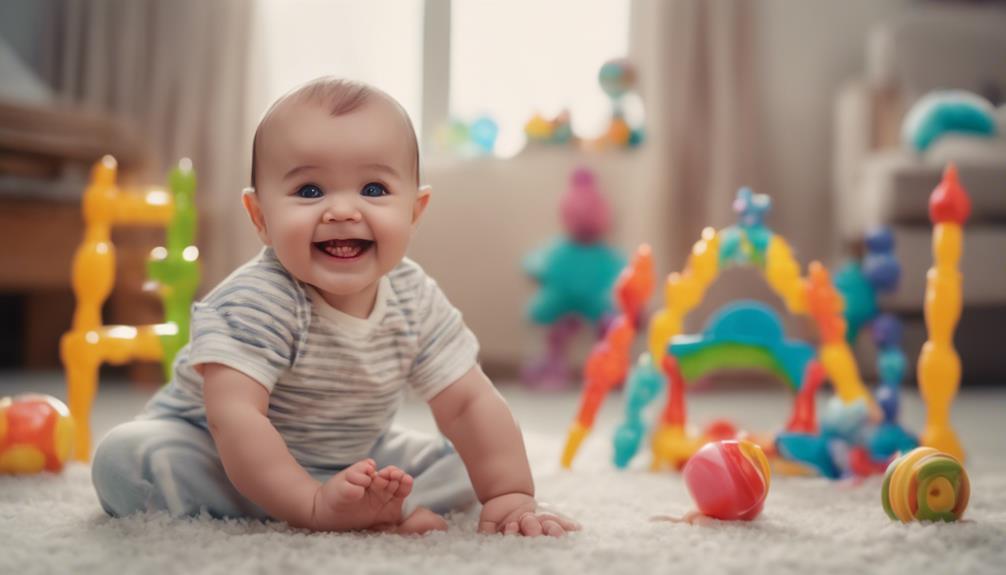
To track your baby's physical milestones accurately, pay attention to their developmental progress in areas like lifting their head, rolling over, and sitting up. Achieving these milestones indicates healthy physical development, including strong muscle tone and coordination.
Additionally, regular weight gain, proper hydration, and good digestion are essential for your baby's overall well-being.
Bright eyes, sound recognition, and eye contact are signs of healthy visual and auditory development in infants.
Moreover, healthy skin, a strong immune system, and quick recovery from illnesses demonstrate good physical health in babies.
Caregiver Bonding
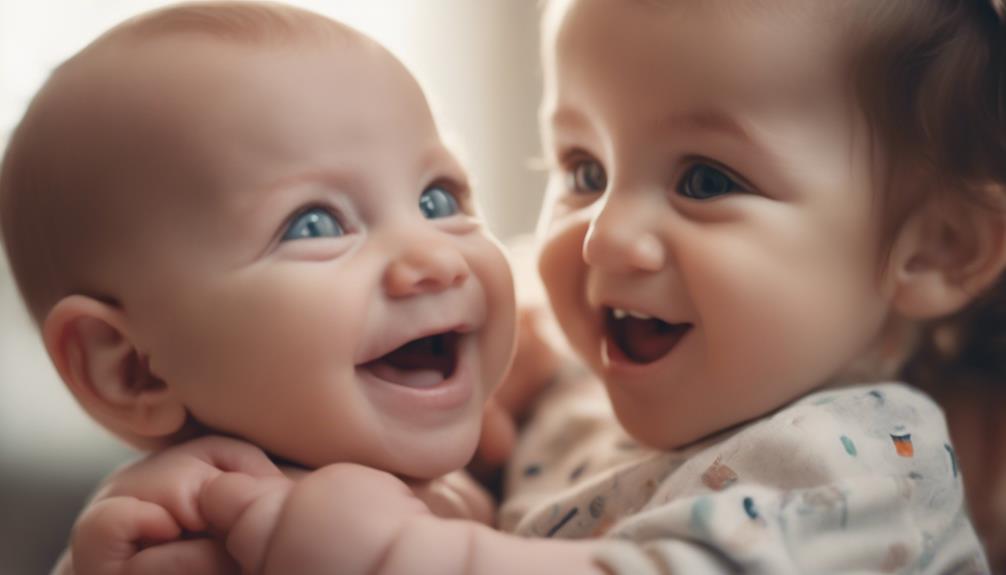
To foster your baby's emotional development and overall well-being, prioritize building a strong bond with caregivers. Caregiver bonding plays a pivotal role in shaping your baby's future social skills, emotional regulation, and sense of safety. Developing a secure attachment with caregivers lays the foundation for trust and mental health in your baby's life.
According to experts, positive caregiver bonding leads to healthy relationships and enhances the child's ability to navigate social interactions. Dr. Smith, a renowned child psychologist, emphasizes the importance of caregiver bonding, stating, 'Secure attachment with caregivers sets the stage for a child's emotional well-being and resilience.'
Research shows that babies who experience strong bonding with caregivers exhibit better emotional regulation and a higher level of trust in their surroundings. Therefore, investing time and effort in building a nurturing relationship with your baby can have lasting positive effects on their emotional and social development.
Frequently Asked Questions
What Is One of the Best Signs of Good Health in a Baby?
Adequate weight gain is one of the best signs of good health in a baby. It shows that your little one is thriving and growing as expected. Keep an eye on those growth charts to track progress!
How Do You Know if Your Baby Is Thriving?
You know your baby is thriving when they show consistent weight gain, have enough wet diapers, are alert and responsive, meet developmental milestones, maintain regular sleep patterns, gain weight adequately, and bond emotionally with you.
What Are the Signs of a Good Infant Mental Health?
You can tell if your baby has good mental health by observing positive responses like eye contact, interest in surroundings, and engaging with you. Watch for milestones like attachment, self-regulation, and communication skills development to guarantee well-being.
How Do You Know Your Baby Is Well?
You know your baby is well when they show regular weight gain, bright eyes, good sleep habits, healthy skin, and engage in eye contact. These signs indicate emotional, physical, and social development for your little one.
Conclusion
To summarize, ensuring the well-being of a baby involves monitoring various signs of health, such as:
- Visual engagement
- Healthy feeding habits
- Responsive communication
- Emotional regulation
- Cognitive development
- Physical milestones
- Caregiver bonding
Just as a skilled navigator uses a compass to guide a ship through rough waters, attentive caregivers must use these indicators as their compass to navigate the journey of raising a healthy and happy baby.
Stay vigilant and observant, for these signs are the key to a thriving infant.

